If引导的条件状语从句
if 条件状语从句
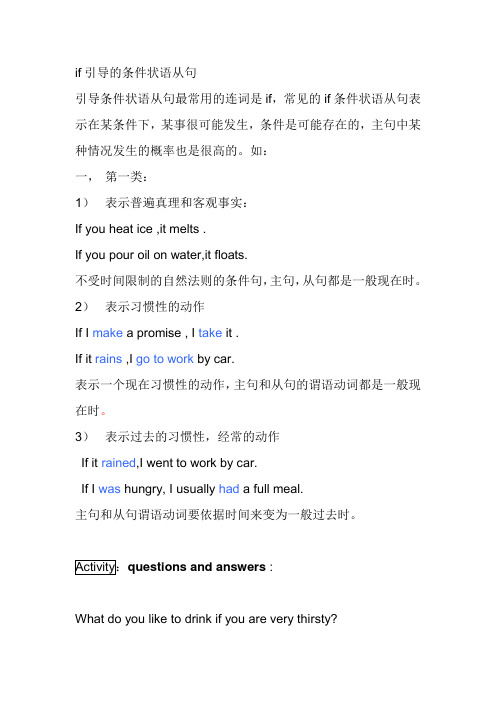
if引导的条件状语从句引导条件状语从句最常用的连词是if,常见的if条件状语从句表示在某条件下,某事很可能发生,条件是可能存在的,主句中某种情况发生的概率也是很高的。
如:一,第一类:1)表示普遍真理和客观事实:If you heat ice ,it melts .If you pour oil on water,it floats.不受时间限制的自然法则的条件句,主句,从句都是一般现在时。
2)表示习惯性的动作If I make a promise , I take it .If it rains ,I go to work by car.表示一个现在习惯性的动作,主句和从句的谓语动词都是一般现在时。
3)表示过去的习惯性,经常的动作If it rained,I went to work by car.If I was hungry, I usually had a full meal.主句和从句谓语动词要依据时间来变为一般过去时。
questions and answers :What do you like to drink if you are very thirsty?How many days are there in February it it is a leap year ? Who do people go and see if they get ill ?第二类:If we catch the 10 o’clock train ,we shall (will ,can,may,must ,should ) get there in time .If it is fine tomorrow ,we can have a picnic somewhere.If you wake up before me , give me a call .条件句(从句)用一般现在表示将来,主句用shall 加动词原型或者是祈使句在if 引导的条件状语从句中,如果从句谈论的是一个有可能发生的事实及其产生的相关的结果,主句用一般将来时态,从句用一般现在时态。
if 条件状语从句
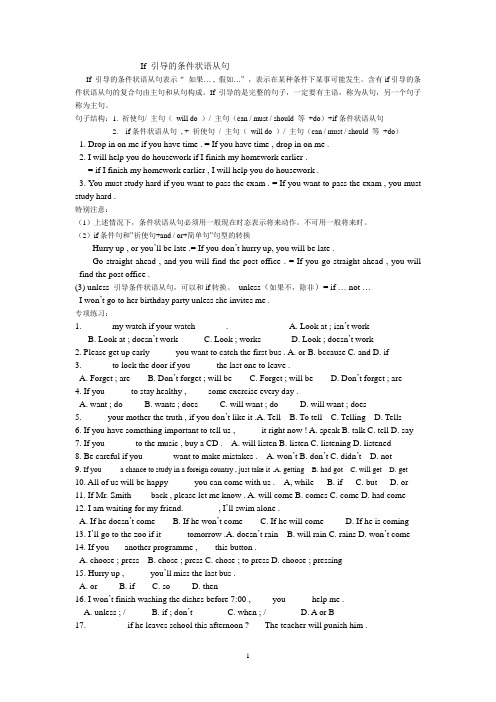
If 引导的条件状语从句If 引导的条件状语从句表示“如果… , 假如…”,表示在某种条件下某事可能发生。
含有if引导的条件状语从句的复合句由主句和从句构成。
If引导的是完整的句子,一定要有主语,称为从句,另一个句子称为主句。
句子结构:1. 祈使句/ 主句(will do )/ 主句(can / must / should 等+do)+if条件状语从句2. if条件状语从句, + 祈使句/ 主句(will do )/ 主句(can / must / should 等+do)1. Drop in on me if you have time . = If you have time , drop in on me .2. I will help you do housework if I finish my homework earlier .= if I finish my homework earlier , I will help you do housework .3. Y ou must study hard if you want to pass the exam . = If you want to pass the exam , you must study hard .特别注意:(1)上述情况下,条件状语从句必须用一般现在时态表示将来动作。
不可用一般将来时。
(2)if条件句和”祈使句+and / or+简单句”句型的转换Hurry up , or you’ll be late .= If you don’t hurry up, you will be late .Go straight ahead , and you will find the post office . = If you go straight ahead , you will find the post office .(3) unless 引导条件状语从句,可以和if转换。
If引导的条件状语从句
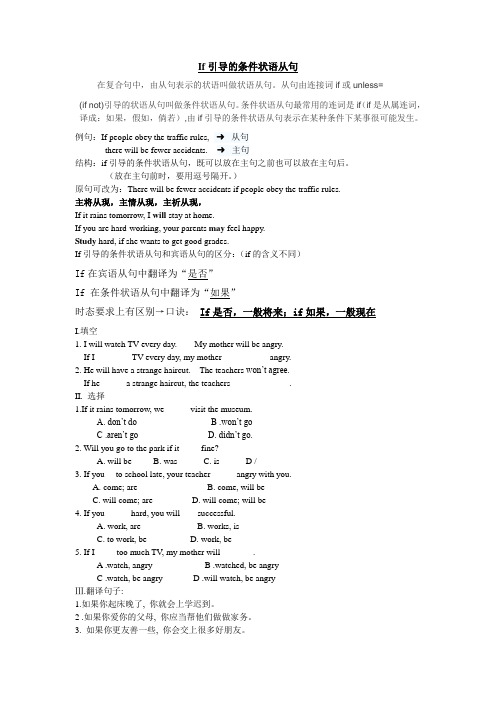
If引导的条件状语从句在复合句中,由从句表示的状语叫做状语从句。
从句由连接词if或unless=(if not)引导的状语从句叫做条件状语从句。
条件状语从句最常用的连词是if(if是从属连词,译成:如果,假如,倘若),由if引导的条件状语从句表示在某种条件下某事很可能发生。
例句:If people obey the traffic rules, ➜从句there will be fewer accidents. ➜主句结构:if引导的条件状语从句,既可以放在主句之前也可以放在主句后。
(放在主句前时,要用逗号隔开。
)原句可改为:There will be fewer accidents if people obey the traffic rules.主将从现,主情从现,主祈从现,If it rains tomorrow, I will stay at home.If you are hard-working, your parents may feel happy.Study hard, if she wants to get good grades.If引导的条件状语从句和宾语从句的区分:(if的含义不同)I.填空1. I will watch TV every day. My mother will be angry.If I ________TV every day, my mother _____ _____angry.2. He will have a strange haircut. The teachers won’t agree.If he _____ a strange haircut, the teachers______ _______.II. 选择1.If it rains tomorrow, we _____ visit the museum.A. don’t do B .won’t goC .aren’t go D. didn’t go.2. Will you go to the park if it ____ fine?A. will beB. wasC. is D /3. If you __to school late, your teacher _____ angry with you.A. come; areB. come, will beC. will come; areD. will come; will be4. If you _____ hard, you will ___ successful.A. work, areB. works, isC. to work, beD. work, be5. If I ____ too much TV, my mother will _______.A .watch, angryB .watched, be angryC .watch, be angryD .will watch, be angryⅢ.翻译句子:1.如果你起床晚了, 你就会上学迟到。
If引导的条件状语从句
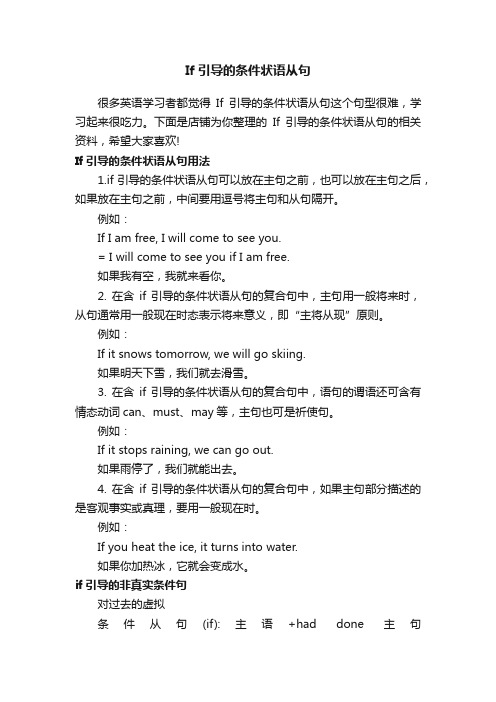
If引导的条件状语从句很多英语学习者都觉得If引导的条件状语从句这个句型很难,学习起来很吃力。
下面是店铺为你整理的If引导的条件状语从句的相关资料,希望大家喜欢!If引导的条件状语从句用法1.if引导的条件状语从句可以放在主句之前,也可以放在主句之后,如果放在主句之前,中间要用逗号将主句和从句隔开。
例如:If I am free, I will come to see you.= I will come to see you if I am free.如果我有空,我就来看你。
2. 在含if引导的条件状语从句的复合句中,主句用一般将来时,从句通常用一般现在时态表示将来意义,即“主将从现”原则。
例如:If it snows tomorrow, we will go skiing.如果明天下雪,我们就去滑雪。
3. 在含if引导的条件状语从句的复合句中,语句的谓语还可含有情态动词can、must、may等,主句也可是祈使句。
例如:If it stops raining, we can go out.如果雨停了,我们就能出去。
4. 在含if引导的条件状语从句的复合句中,如果主句部分描述的是客观事实或真理,要用一般现在时。
例如:If you heat the ice, it turns into water.如果你加热冰,它就会变成水。
if引导的非真实条件句对过去的虚拟条件从句(if):主语+had done 主句might/would/should/could+have done对现在的虚拟if+ 主语+动词过去式(be用were)主句might/would/should/could+do对将来的虚拟if+主语+动词过去式(be用were)或主语+should do或主语+were to do主句 might/would/should/could+doe.g.Tom got to the station in time because he started earlier.If Tom had started late, he would have missed the train.Do you think the thief entered through the door?No, if he had, I don't believe, he would have broken the living room window.If the book weren't so expensive, I would buy it.If you didn't live so far away, we would be able to visit you more.What would you do if you lost your passport in a foreign country?Why hasn't he come? If he should not come on time, we would have to put off the trip.2.注意事项e.g.If she hadn't work hard at English in the past, she wouldn't work as well as a secretary in a large company now. 混合时间的虚拟语气从句为对过去的虚拟,主句是现在。
if引导的条件状语从句总结(精)
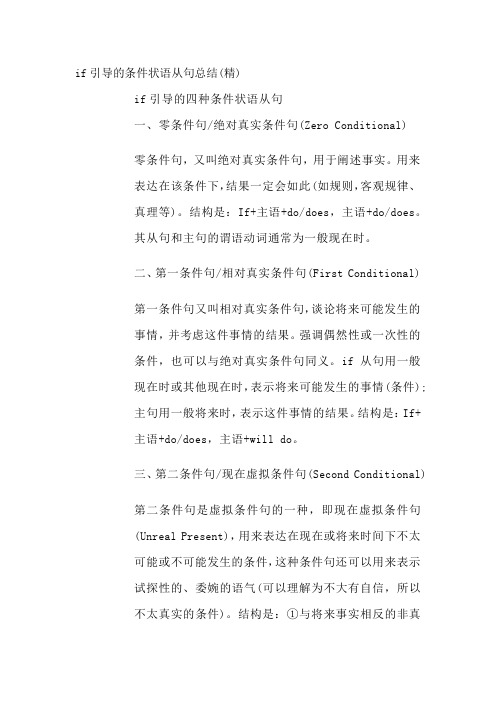
if引导的条件状语从句总结(精)if引导的四种条件状语从句一、零条件句/绝对真实条件句(Zero Conditional)零条件句,又叫绝对真实条件句,用于阐述事实。
用来表达在该条件下,结果一定会如此(如规则,客观规律、真理等)。
结构是:If+主语+do/does,主语+do/does。
其从句和主句的谓语动词通常为一般现在时。
二、第一条件句/相对真实条件句(First Conditional)第一条件句又叫相对真实条件句,谈论将来可能发生的事情,并考虑这件事情的结果。
强调偶然性或一次性的条件,也可以与绝对真实条件句同义。
if从句用一般现在时或其他现在时,表示将来可能发生的事情(条件);主句用一般将来时,表示这件事情的结果。
结构是:If+主语+do/does,主语+will do。
三、第二条件句/现在虚拟条件句(Second Conditional)第二条件句是虚拟条件句的一种,即现在虚拟条件句(Unreal Present),用来表达在现在或将来时间下不太可能或不可能发生的条件,这种条件句还可以用来表示试探性的、委婉的语气(可以理解为不大有自信,所以不太真实的条件)。
结构是:①与将来事实相反的非真实条件句是If+主语+should do/were to do/did,主语+would/should/could/might do;②与现在事实相反的非真实条件句是If+主语+did,主语+would/should/could/might+do。
四、第三条件句/过去虚拟条件句(Third Conditional) 第三条件句是表示与过去事实相反的虚拟语气,是用来表达如果(If)当时那样发生,另外一方面(当时)结果会如何。
通常是指过去的事情,带有一切已经太迟而不能够补救的意思。
结构是:If+主语+had done,主语+would/should/could/ might+have done。
if 条件句的时态搭配1.if从句用一般现在时,主句用一般将来时2.if从句用一般现在时,主句用may/might/canIf the fog gets thicker the plane may/might be diverted.3.if从句用一般现在时,主句用must/shouldIf you want to lose weight you must/should eat less bread.4.if从句用一般现在时,主句用一般现在时5.if从句用现在进行时,主句用一般将来时6.if从句用现在完成时,主句用一般将来时If you have finished dinner I’ll ask the waiter for the bill.。
If-引导的条件状语从句
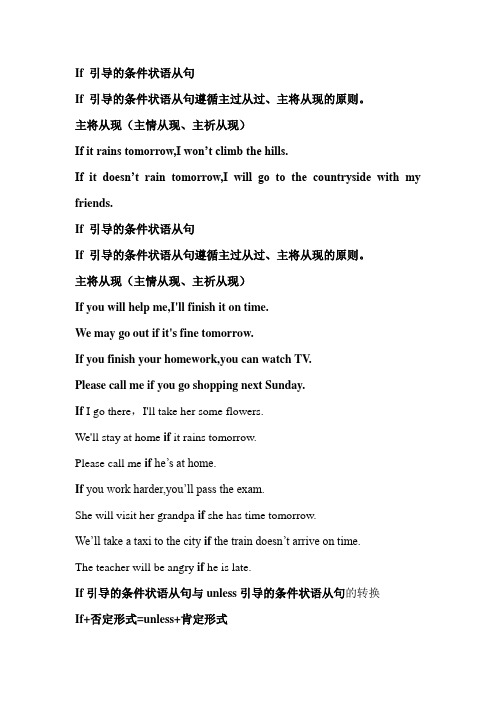
If 引导的条件状语从句If 引导的条件状语从句遵循主过从过、主将从现的原则。
主将从现(主情从现、主祈从现)If it rains tomorrow,I won’t climb the hills.If it doesn’t rain tomorrow,I will go to the countryside with my friends.If 引导的条件状语从句If 引导的条件状语从句遵循主过从过、主将从现的原则。
主将从现(主情从现、主祈从现)If you will help me,I'll finish it on time.We may go out if it's fine tomorrow.If you finish your homework,you can watch TV.Please call me if you go shopping next Sunday.If I go there,I'll take her some flowers.We'll stay at home if it rains tomorrow.Please call me if he’s at home.If you work harder,you’ll pass the exam.She will visit her grandpa if she has time tomorrow.We’ll take a taxi to the city if the train doesn’t arrive on time.The teacher will be angry if he is late.If引导的条件状语从句与unless引导的条件状语从句的转换If+否定形式=unless+肯定形式You won’t pass the exam if you don’t work hard.=You won’t pass the exam unless you work hard.If you don’t go to bed earlier,you will feel tired in the morning. =Unless you go to bed earlier,you will feel tired in the morning. If it doesn’t rain,he will play with me tomorrow.=Unless it rains,he will play with me tomorrow.If she doesn’t come,I’ll go shopping alone=Unless she comes,I’ll go shopping alone.if条件状语从句与祈使句,and/or+一般将来时的句子转化If you get up early,you’ll get there on time.=Get up early,and you’ll get there on time.=Get up early,or you won’t get there on time.If you get up early,you won't be late for school.=Get up early,and you won't be late for school.=Get up early,or you will be late for school.If you don’t get up early,you won’t catch up with the early bus. =Get up early,and you will catch up with the early bus.=Get up early,or you won’t catch up with the early bus.if条件状语从句与without的句子转化If there is no water,we can't live.=We can't live without water.If there is no water,fish will die.=Fish will die without water.If you help me,I’l l finish the work soon.=With your help,I finish the work soon.if条件状语从句与祈使句,and/or+一般将来时的句子转化If you get up early,you’ll get there on time.=Get up early,and you’ll get there on time.=Get up early,or you won’t get there on time.If you get up early,you won't be late for school.=Get up early,and you won't be late for school.=Get up early,or you will be late for school.If you don’t get up early,you won’t catch up with the early bus.=Get up early,and you will catch up with the early bus.=Get up early,or you won’t catch up with the early bus.1. your friend ,I'll tell you.eB.will comeesD.are coming2. If you go to college,you a good education.A.will getB.getC.getsD.got3.I want to know if they tomorrow.eB.will come C comes D.came4.Take enough exercise, you'll be in good heath.A.orB.soC.butD.and5.If it (not rain),he (play)basketball withme tomorrow.6.If Uncle Lan ______(come),I______(call)you up.7.She must see a dentist if she______(have)a toothache.8.Please wake me up if he______(come)back.9.Hurry up!Or you ______(be)late again.10.If you don’t be quick,you(be)late.1.We won’t wait for you you can’t arrive on time.A.untilB.whenC.afterD.if2.The children will go to the zoo if it (not rain)this Saturday.3.If she work hard,she be able to go to colleage.A.not,notB.won’t,won’tC.won’t,doesn’tD.dpesn’t,won’t4.If I run every day,I (be)healthier.5.If it (not rain),he (play)with me tomorrow.6.She must see a dentist if she (have)a toothache.7.Study hard,or you (not pass)the test.8.If you (not go)to bed earlier,you will feel tired in the morning.9.If he (be)free tomorrow,he will come to your birthday party.10.We will go to the zoo if it (not snow)tomorrow.。
if引导的条件状语从句造句
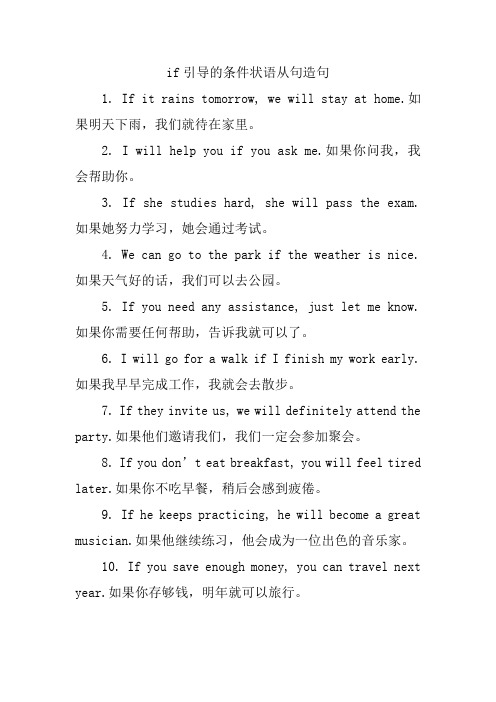
if引导的条件状语从句造句
1. If it rains tomorrow, we will stay at home.如果明天下雨,我们就待在家里。
2. I will help you if you ask me.如果你问我,我会帮助你。
3. If she studies hard, she will pass the exam.如果她努力学习,她会通过考试。
4. We can go to the park if the weather is nice.如果天气好的话,我们可以去公园。
5. If you need any assistance, just let me know.如果你需要任何帮助,告诉我就可以了。
6. I will go for a walk if I finish my work early.如果我早早完成工作,我就会去散步。
7. If they invite us, we will definitely attend the party.如果他们邀请我们,我们一定会参加聚会。
8. If you don’t eat breakfast, you will feel tired later.如果你不吃早餐,稍后会感到疲倦。
9. If he keeps practicing, he will become a great musician.如果他继续练习,他会成为一位出色的音乐家。
10. If you save enough money, you can travel next year.如果你存够钱,明年就可以旅行。
if引导的条件状语从句主句从句

if引导的条件状语从句主句从句
1. If it rains tomorrow, we will cancel the picnic.
如果明天下雨,我们将取消野餐。
2. I will help you with your homework if you ask me nicely.
如果你好好请求我,我会帮你做作业。
3. If you study hard, you will pass the exam.
如果你努力学习,你就会通过考试。
4. She will go to the party if she finishes her work on time.
如果她按时完成工作,她会去参加聚会。
5. If you don’t hurry, you will miss the bus.
如果你不快点,你会错过公交车。
6. We can go for a hike if the weather is nice.
如果天气好,我们可以去远足。
7. If he apologizes, I will forgive him.
如果他道歉,我会原谅他。
8. You will succeed if you believe in yourself.
如果你相信自己,你会成功。
9. If they invite us, we will definitely attend the wedding.
如果他们邀请我们,我们一定会参加婚礼。
10. If you keep practicing, you will improve your skills.
如果你继续练习,你会提高你的技能。
- 1、下载文档前请自行甄别文档内容的完整性,平台不提供额外的编辑、内容补充、找答案等附加服务。
- 2、"仅部分预览"的文档,不可在线预览部分如存在完整性等问题,可反馈申请退款(可完整预览的文档不适用该条件!)。
- 3、如文档侵犯您的权益,请联系客服反馈,我们会尽快为您处理(人工客服工作时间:9:00-18:30)。
5. If you __d_o_n_’_t _w_o_rk___(not work ) hard , you _w_o_n_’_t _p_as_s_(not pass) the exam.
6. If she __m__e_n_d_s_(mend) the computer , her father __w_o_n_’t_b_l_am__e_(not blame ).
1.有if引导的条件状语从句的复合句中,当主句和从句的 主语均为you时,可转换为“祈使句,and+简单句”或
“祈使句,or+简单句” You can pass the exam if you work hard. Work hard ----------------,and you will pass the exam.
If you don't hurry up,you will be late again.
or Hurry up,------ you will be late again.
2. 借助介词with 或without来转换。
例如: If you help me, I’ll finish my job soon.
If引导的条件状语从句
潘店镇中学
if引导的条件状语从句
例句:If people obey the traffic rules, →从句 there will be fewer accidents. →主句
if:从属连词,意思是:“如果,假如,倘若”
: 结构
if引导的条件状语从句既可以放在句子前, 也可以放在句子后。
时态:
if引导的条件状语从句, 主句用一般将来时(will),从句用一般现在时。
→主句谓语中也可以含有情态动词, 如:must,can,could,should等
: 例句 如果交通指示灯是红的,你必须停下来等一等。
eg:If the traffic lights are red,you must stop and wait. →主句谓语中也可以用had better(not)do,提建议
3. – What are you going to do tomorrow? --We’ll go to the library tomorrow if it _D__. A. isn’t rain B. rain C. won’t rain D. doesn’t rain 4. What will you do if you ___A__ to the old folk’s home visit? A. go B. went C.going D. will go
W--i-t-h--y--o-u--r--h--e-l-p-, I’ll finish my job soon. 如果你帮我,我将很快完成我的工作。 If there is no water, fish may die.
Fish may die w--i-th--o--u-t--w--a--t-e-r--. 如果没有水,鱼可能会死。
I’ll go to see you if I am free next week.
If 在条件状语从句中翻译为“如果”
2. if 在从句中的位置不同 I don’t know if the train has arrived.
I will go out tomorrow if it doesn’t rain. = If it doesn’t rain, I will go out tomorrow.
9. If she __is_n_’t___(not be) interested in math, she will find it very boring . 10. If you __g_e_t_____(get ) high scores, your parents will be proud of you .
• 注意事项 • 1. 在if引导的条件状语从句中,当主句是一般将
来时时,不能够使用be going to结构,而要用 will。 • 例如: I’ll help you with your English if I am free tomorrow. 如果明天我有空,我会帮你学英 语。
• 2. 在if引导的条件状语从句中不能够使用some, 而要用any。
2 If I ___c_o_p_y____(copy ) your homework , I will cheat myself .
3 If she ___d_o_e_s_n_’t_g_e_t____(not get ) up early , she’ll miss the early bus .
4 If your mother___b_u_ys__ (buy) the book for you , it will be good for your study.
I won’t go there _____ I _____hear from you. I won’t go to the party if I am not invited. (同义 句) unless I won’t go to the party_____ I am invited.
变换:
从句位于主句之前时,常用逗号将其与主句隔开。
原句可改为:There will be fewer accidents if people obey the traffic rules.
例句:If people obey the traffic rules, there will be fewer accidents.
7. If your brother ____b_r_e_a_ks____(break) the window , he will feel very sorry for that .
8. If the computer doesn’t work (not work), mend it please .
11. If you ___a_re_____(be) happy , we will be happy .
12. If she translates (translate ) the sentence word by word , she __w_il_l _g_e_t_(get ) its true meaning .
• 例如: If you have any questions to ask, please come to my office. 如果你有问题要问的 话,请到我办公室来。
1. if 在句中的含义不同 I want to know if he is a teacher.
whether
If 在宾语从句中翻译为“是否”
If 引导的宾语从句的时态由主句及本身时 态决定;
2.If it doesn’t rain , we’ll hold it.
If 引导条件状语从句的时态为一般现在时 记住“主将从现”
1 If I _d_o_n_’_t _u_n_d_e_rs_t_an_d__(not understand), I will ask my teacher for help .
1.If you __C___ to the party, you’ll have a great time.
A. will go B. went C. go D. going 2. I __D__ her the answer if she ____me.
A.can tell, will ask B. will tell, will ask C. would tell, ask D. will tell, asks
If 引导的宾语从句放在主句之后;而if引 导的状语从句可放在主句之前也可放在主 句之后
If 引导的条件状语从句放于句首时多用逗号隔开; 而if引导的宾语从句则不能。
1. come to the meeting ?
2. She will not go there if it is rainy tomorrow.
3. I can’t guess if she will be angry .
4. If we help each other , we both will get good results .
3. 时态要求上有区别
1.I want to know if there will be
a
sports meeting next month.
例句:如果你想减肥,你最好锻炼。 eg:If you want to lose weight,you had better take some
exercise.
if的反义词:if...not...=unless,意思是:“如果不,除非”
I won’t go there unless I hear from you.(同义 if 句) don’t
